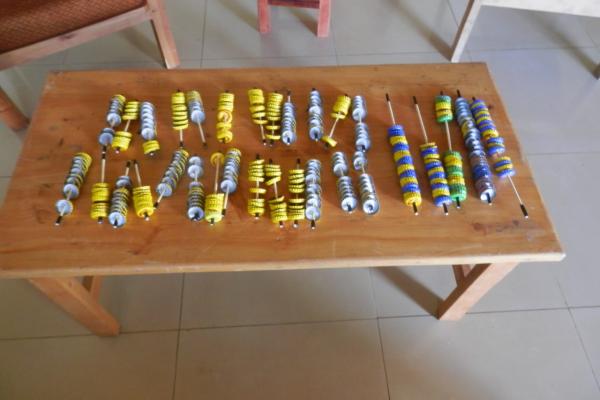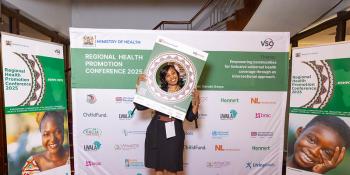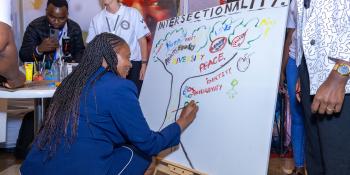Mary Watkins shares practical tips VSO volunteers have learned from the pragmatism and ingenuity of teachers in the world's poorest communities.
For many parents, the closure of schools to stop the spread of the coronavirus pandemic means the kitchen table is now also the office - and the children's classroom. With a lack of whiteboards, desks and workbooks, keeping your young children engaged can be a daunting task.
This is the daily reality faced by teachers in poor communities around the world. Trying to educate large numbers of children with the most meagre of resources is a challenge - but one that can be met, through creativity and resourcefulness.
The importance of low-cost teaching aids
In many of the countries where VSO works, volunteers work to support local teachers to develop learning resources for little – or even no – cost.
Mary Watkins, who volunteered in a nursery in Rwanda, shares her experience of having up to 50 children in one classroom with so few resources.
“I was working at a teacher training college in Rwanda. Teachers there don't have any resources and don't have the money to buy them. It was therefore really important for us to make our own using whatever was around us,” said Mary.
“I decided that I wanted to put everything we made together in a booklet, which was then shared around the training teachers in the country,” she added.
Make your own ‘Show Me’ board
For Mary, this simple resource is the most versatile and an essential classroom aid. It’s easy to make and can be used in every lesson. The 'Show Me' board is great for draft work, practising writing numbers, ensuring participation and keeping children engaged.
“The standard lesson where teachers just stand at the front and talk doesn't work - the children must be bored rigid! Without any participation, it's also difficult to know if they understand what you've been explaining.”
“The 'Show Me' board is a great way of getting 100% participation. Plus, you can instantly see whether they've got the right answer and check understanding. 'Show Me' boards are really easy to make and keep kids entertained.” said Mary.
- Simply find some cardboard - a cereal box will work - and cut an A4 sized rectangle.
- From here, you’ll need to paint both sides black. When dry, draw a grid of squares on one side using white paint.
- Grab some chalk and your children can answer questions, practice maths problems, play drawing games and take part in assessments.
Using bottle tops for number work
Mary's next suggestion is making counting games using any bottle tops you have – the more the better! This is a great way to practice number work with children of all ages.
“People assume this sort of thing is just for nursery children, but you can use them for a range of ages if used in creative ways. Maths can be very abstract. It’s helpful for many people to use something visual to understand and remain interested,” explains Mary.

- Collect old bottle tops, give them a good wash in soapy water and then leave to dry.
- Use a hammer and a thick nail to make a hole in the bottle tops.
- Thread them onto string, old phone cables, wire, thin sticks... you name it. You can group them in multiples colours or label them different numbers.
“These can be used in so many ways. One example is simply by putting sets of ten counters labelled 100 on a string. This is useful for counting from 100 to beyond when you don’t want to count one by one.”
Easy to make and fun to use, these bottle tops can be used for children of any age as a visual aid to help any number work such as multiplication and division.
Having fun with it
These resources are quick, easy and fun to use at such a straining time. However, Mary emphasises the importance of parents with children at home not putting too much pressure on themselves:
“The most important thing is to make it fun and not to force it. You don’t have the replace the teacher. It's amazing how creative you can get when trying to make education engaging and fun.”
“The teachers in Rwanda were amazing. They loved coming up with new resources from such little and ways we could incorporate them into lessons,” said Mary.
For more amazing resources to keep you (and your little ones) busy at home, explore the full Numeracy for All Guide and video series.
VSO School app: Using technology to empower educators
For those teachers across the poorest communities in the world – who live in a reality of educating children with very few resources all year round – VSO developed the VSO School app.
The app was born out of the need to share low-resource education ideas more widely, even to settings without a VSO volunteer, or to complement a volunteer placement.
VSO’s Lead Education Adviser, Purna Shrestha, explains the importance of this app and how it’s able to teach skills like this to teachers in low-resource settings all over the world.
“In many countries we work in, there isn't reliable internet access. On the VSO school app, once the content is downloaded you don’t need internet so teachers can view demonstration lessons, have access to books and videos and even pass on this knowledge to parents in the community.”
The Android app contains videos, lesson plans and electronic versions of the resource toolkit – all of which can be accessed offline, so teachers can watch videos, develop lessons for their pupils, and develop their own knowledge and skills through training, all on their mobile phone.
And all of this can be accessed in local languages, explains Purna.
“Whether you’re in Cambodia, Nepal or Rwanda, the platform allows us to create many lessons in the local language, so it really is accessible.”
Read more

The two volunteers empowering girls and young women in Mozambique
Nelma and Carmirene and are two volunteers working on VSO's EAGLE project in Mozambique. For Nelma and Carmirene, education is not just about school, it is about meeting people where they are and using the right tools to challenging harmful norms. Here are their stories.

In photos: Our Regional Health Promotion Conference 2025
Check out some of our favourite photos from Regional Health Promotion Conference (RHPC25). This event sought to reimagine Universal Health Coverage through the lens of intersectionality.

Using intersectionality to create healthy beginnings and hopeful futures
World Health Day brings global attention to the urgent need to end preventable maternal and newborn deaths. Learn more about how our Regional Health Promotion Conference is tackling these issues head on.
